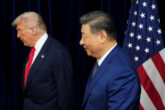March 30, 2021
Around the Table with Melodie Ha
Three Questions with the Make Room Email Newsletter
Around the Table is a three-question interview series from the Make Room email newsletter. Each edition features a conversation with a peer in the national security community to learn about their expertise and experience in the sector.
Melodie Ha is a consultant at Guidehouse and has previously worked in think tanks and the government. The views expressed are those of the author and do not reflect the position of Guidehouse or the U.S. Government.
You’ve traversed a number of spaces—think tanks, U.S. agencies, and consulting—are there any takeaways you would have for people transitioning between them?
For folks who are interested in public service, having a diversity of experiences and looking at policy from different perspectives is helpful. Working at U.S. agencies gave me the opportunity to work on the front lines of policy, but I also experienced how bureaucracy works, including the challenges of communicating across offices and agencies. On the other hand, while consultants and think tankers don’t implement policy, they are extremely helpful in providing insight, knowledge, and support in areas that many government agencies need. The best advice I could provide for folks who are interested in transitioning is to be flexible with the organization and to hone in on specific skillsets, such as being an expert on a certain research topic or developing a technical skillset in something like data analysis. Having a unique skill is always the best way to leverage yourself as an asset, regardless of what organization you work for.
China is a hot topic; what do you think is getting missed in reporting that is important for people to know?
As a China analyst who is of Chinese heritage, I think one of the biggest challenges with China is the tendency for a lot of analysts, reporters, and government folks to regard it and everything Chinese as a monolith. It’s important to distinguish between Chinese people and the Chinese government (aka the Chinese Communist Party), and also recognize how a lot of U.S. policy decisions regarding China impact the Chinese-American and Taiwanese-American community in a way that promotes racism and unwarranted suspicion. Sometimes people miss the difference with what the vast majority of ordinary Chinese citizens want and truly care about, and what the Chinese government wants. I also think it’s okay and should even be encouraged to talk about China where it does well, and that everything that is reported should not be automatically slanted as “China, bad." Finally, maybe not directly national security related, but I would love to see more reporting on Chinese culture, like food, languages, and holidays. I’m a firm believer of being educated in all aspects of a country or a region if you’re going to be an analyst or a reporter, and I think more reporting would help people see more nuance that helps them form smarter opinions.
You’re passionate about gender inclusion; in your experience, what has worked best to advance inclusion in the workplace?
In my opinion and experience, leadership plays a huge role in advancing inclusion in the workplace. For example, the intersection of consulting and national security is primarily dominated by men, but I have been extremely lucky to work for a lot of women managers and directors who serve as really amazing role models and mentors in how to advance in your career and how to be a woman leader. I think being able to see these women in positions of power and seeing how they balance their work and their life is important for young women who are seeking a career in the field. Representation matters.
I also encourage everyone (men and women) who are passionate about gender inclusion to really advocate for it in the work that you do. I’ve always made it a point to express my desire to work on gender-related issues within foreign policy and joining affinity groups or professional development programs to my colleagues and my bosses, and they have been supportive in placing me on projects that are related to the issues I’m interested in.
Thank you for registering! You will receive a confirmation email shortly. All CNAS events are free, open to the public, and viewable from cnas.org/live.
Stay up-to-date with report releases, events, major updates, and announcements from the Center for a New American Security.
More from CNAS
-
Chinese Maker of Bitcoin-Mining Machines Is a Security Threat, Says Expert
Bloomberg News reports that a Chinese manufacturer, Bitmain Technologies Ltd, that sells most of the world’s Bitcoin-mining machines — including 16,000 of them to a venture ba...
By David Feith
-
Indo-Pacific Security / Energy, Economics & Security
North Korea’s Provocations, Power Plays, and Shifting AlliancesTensions on the Korean Peninsula have reached a new and dangerous threshold. President Lee Jae Myung is warning of a real risk of accidental military clashes, as the situation...
By Dr. Go Myong-Hyun
-
Indo-Pacific Security / Energy, Economics & Security
How to Win the Economic War with ChinaTrump's approach to China has run aground, giving Beijing unprecedented advantage in the economic conflict....
By Edward Fishman & Julian Gewirtz
-
Indo-Pacific Security / Technology & National Security
Sharper: Tech + ChinaRecent talks between President Donald Trump and Chinese Communist Party General Secretary Xi Jinping placed a spotlight on emerging technologies, from high-end chips to minera...
By Charles Horn & Sevi Silvia




